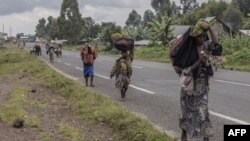"M23 has seen the document on social media... There was nobody in the summit (from M23) so it doesn't really concern us," Lawrence Kanyuka, political spokesman for the M23 (March 23) movement, told AFP.
"Normally when there is a ceasefire it is between the two warring sides," he added.
Angola Foreign Minister Tete Antonio on Wednesday announced representatives from DRC, Rwanda Burundi and Angola, including facilitator Uhuru Kenyatta, former president of Kenya, had agreed on a cessation of hostilities set to begin Friday.
DRC's President Felix Tshisekedi and Rwanda's Foreign Minister Vincent Biruta attended the summit held in Luanda.
Kanyuka said the rebels declared a "unilateral ceasefire" in April and believed it was still in force.
"If tomorrow [Friday] at 6:00 pm (1600 GMT), or in the morning, the government doesn't attack us, we will still be there," Kanyuka said.
Otherwise, "we are defending ourselves," he said.
"We are always ready for a direct dialogue with the Congolese government to resolve the root causes of conflicts," he added.
The Luanda summit concluded with a deal on the cessation of hostilities in eastern DRC from Friday evening, followed by the withdrawal of M23 rebels from "occupied zones" and their "withdrawal to their initial positions".
If the rebels refuse, the east African regional force being deployed in Goma "will use force" to push them out, the deal said.
The statement issued on Wednesday included an agreement to cease all politico-military support to the M23 and all other local and foreign armed groups in the region.
M23 rebels had been dormant for years but took up arms again late last year and have been seen from the start by Kinshasa as actively supported by Rwanda, which denies the charges.
The rebels recently seized large portions of territory north of Goma, the provincial capital of Nord-Kivu province.
Some information for this report came from Reuters.










